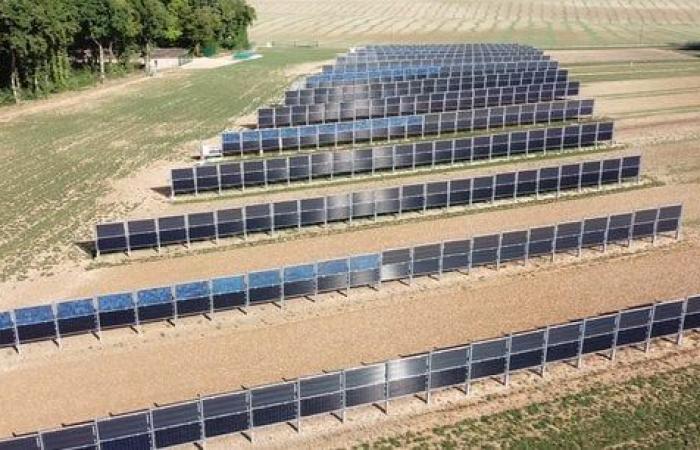
Agrivoltaism, a practice that combines sustainable agriculture and solar energy production, is emerging as a solution to current environmental challenges. In France, this booming sector is attracting the attention of large groups, such as TotalEnergies, the third major player in renewable energies in France, which has signed a partnership with Dijon Céréales, a pioneering agricultural cooperative in Burgundy-Franche-Comté. agrivoltaism and methanization. This project, which extends over 300 hectares, represents a significant investment over ten years, between 250 and 400 million euros, and aims to secure farmers' income, while maintaining food production.
A promising collaboration
The two partners have already set up a demonstrator in Channay (in the north of the Côte-d'Or), which has made it possible to validate the viability of agrivoltaism. Christophe Richardot, general manager of Dijon Céréales, underlines: “ This project demonstrated measurable agronomic benefits, while allowing farmers to diversify their production. » Indeed, solar panels installed on shallow land have created favorable microclimates, protecting crops from climatic hazards while reducing water consumption.
Nicolas Ferras, agrienergy director of TotalEnergies, adds that this initiative aims to “ establish a real agri-energy sector within the cooperative, with strong territorial roots. » This partnership is based on the co-construction of projects, with a local team of 20 people from TotalEnergies based in Dijon, thus guaranteeing the sustainability of the installations and the involvement of farmers.
Climate: around a hundred Côte-d'Or farmers are turning to agroenergy to diversify their income
Ambitious long-term goals
The partnership between TotalEnergies and Dijon Céréales is not limited to a simple pilot project. The two players aim to develop up to 1,500 hectares of agrivoltaic farming, over a period of ten years, in the Burgundy-Franche-Comté region. “ We have already signed 600 leases with our members, and our objective is to support each farmer in this process », specifies Christophe Richardot. This economic model offers a stable source of income to farmers, over the long term, with contracts spanning 30 to 50 years, while preserving food production. The economic profitability of an installation is estimated between 1,500 and 2,000 euros per hectare, thus generating additional income for farmers in the long term.
The technologies considered for this project include fixed bifacial panels and solar trackers, which adapt to different forms of agriculture, whether conventional or organic.
Environmental and economic benefits
Agrivoltaism is also seen as a solution to strengthen the resilience of agricultural operations in the face of climate change. “ Creating micro-ecosystems under solar panels can have benefits for biodiversity », explains Nicolas Ferras. Studies show that the shading created by panels can reduce water stress on crops, thereby decreasing the need for irrigation.
The feedback from the Channay demonstrator, set up by Dijon Céréales and TotalEnergies, is promising. The first years showed measurable agronomic benefits, with improved yields and diversification of production, such as the cultivation of lavandin and honey.
How agrivoltaism can support certain agricultural sectors
Challenges to overcome
However, the development of agrivoltaism is not without challenges. Administrative delays for project processing can reach 5 to 6 years, which represents a significant obstacle. “ Speeding up procedures is essential to maximize profits for our farmers », notes Nicolas Ferras. At the same time, the distance from the electricity network can complicate the economic viability of projects.
Long-term cooperation
The project co-development model between TotalEnergies and Dijon Céréales is proving to be a key success factor. The direct involvement of the cooperative in project management and the credibility of a company like TotalEnergies reassures farmers about the sustainability of the initiatives. “ We act as a trusted third party, providing our knowledge of the territory and agricultural sectors », affirms Christophe Richardot.
As the country resolutely commits to an energy transition, this collaborative model could well serve as a reference for other regions and players in the sector. As Nicolas Ferras points out, “ agrivoltaism is not only a response to environmental challenges, but also an opportunity to revitalize agricultural territories and ensure their future. »





